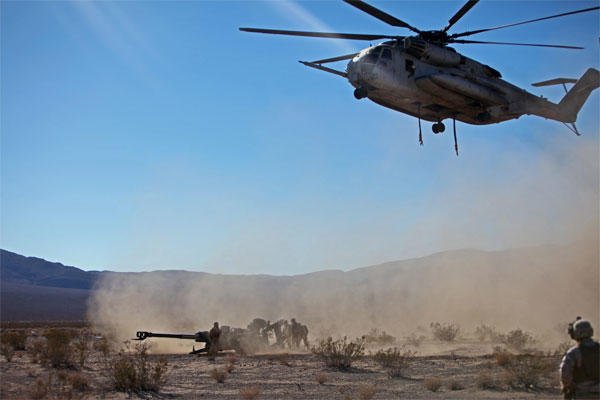TWENTYNINE PALMS, Calif. - Helicopter Support Team Marines with Landing Support Company, Combat Logistics Regiment 17, 1st Marine Logistics Group inspected the heavy equipment transport lines of an inbound CH-53E Super Stallion Helicopter during recent supply operations at Marine Corps Air Ground Combat Center Twentynine Palms, Calif.
The unit was assisting in the lift of M777 howitzers to support 2nd Battalion, 11th Marine Regiment, while the unit participated in Exercise Steel Knight 2014, an annual exercise designed to prepare the 1st Marine Division for deployment as part of the Marine Air-Ground Task Force as the Ground Combat Element with the support of 1st MLG and 3rd Marine Air Wing. Combined, the MAGTF is able to deploy and respond in a timely manner to any situation across the globe.
According to Pfc. Titus Gietzen, an HST Marine with the unit, turbulent wind conditions, heavy sand from the helicopter backwash and frigid temperatures were just a few of the challenges the Marines faced during their training, Dec. 6. However, the Marines overcame these challenges and used the opportunity to gain experience operating in an environment similar to Afghanistan.
“This is what we do,” said Gietzen. “No matter what, we provide supplies to the front lines so that they can continue their operations without having to wait too long for the equipment they need to complete the mission.”
The Marines work to operate with maximum efficiency in operational environments and air support is one of the tools they use to achieve this goal.
“Using air support to provide Marines with the equipment they need eliminates several of the risks involved in doing the same task with a convoy operation,” said Sgt. Christopher Gentz, platoon sergeant with LS Co. “The resupplies are significantly quicker when done by air. A three-hour convoy could take 10 minutes travel time with a helicopter.”
The Marines of LS Co. use these training operations to ensure they are proficient in completing the tasks that would be expected of them in a real- life scenarios.
“We like to use these operations specifically to train up our junior Marines,” said Gentz, a native of Sparta, Mich. He reiterated the importance of realistic training. “If my Marines know what they are doing [here], it could easily make the difference in saving lives in-country.”























